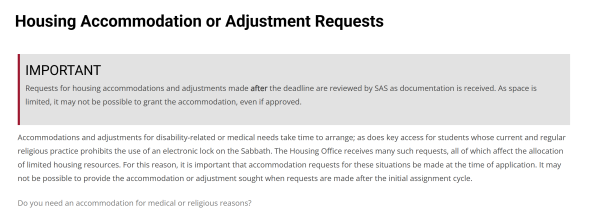
Room to Accommodate
There are many reasons why someone might need accommodations during their time at Dartmouth. These can be medical, ranging from physical disabilities to chronic illness to mental health conditions, or religious based on certain practices and needs. Luckily, Dartmouth is committed to making sure students have the resources they need from day one (and sometimes before, if you are arriving early for a pre-orientation program). Dartmouth works to provide a variety of accommodations that suit each person's individual needs, whether they are academic, dining, or housing-related, just to name a few. This post is not meant to be an all-encompassing guide to accessibility at Dartmouth, but rather a window into how housing accommodations work. After all, living on campus is such a core part of the Dartmouth experience that it would be unfair and isolating to not be able to participate in it fully just because their housing doesn't meet their needs.
The housing accommodation process is designed for anyone who needs certain types of housing (e.g. single rooms, rooms with no carpet, single-gender floors, wheel-chair accessible dorms) due to medical or religious reasons. When filling out a housing questionnaire, you must indicate whether you have accommodations for medical or religious reasons, or both.

You will submit two types of requests depending on the reason you are seeking accommodations:
Medical:
If you are seeking housing accommodations due to medical reasons, you will apply for services by submitting a new request through Student Accessibility Services (SAS), the office that arranges all medical-related accommodations. You can also submit documentation from a medical provider about your condition(s). SAS will assign you an advisor, whom you will meet and work with to determine an accommodation that suits your needs. Once a housing accommodation is approved, your SAS advisor will notify both you and the Office of Residential Life details of said accommodation.
Religious:
After notifying the Office of Residential Life that you are seeking religious accommodations, you will fill out a form asking you to describe your faith, observances and practices, and accommodations you are seeking. Once you submit that form, you will meet with a Chaplain to discuss your needs.
At the end of the day, Dartmouth's commitment to accessibility ensures that all students, regardless of their medical conditions or religious practices, have the opportunity to feel safe and supported. Your dorm isn't just a place to sleep; it's where you can build friendships, unwind after a long day, and create your version of home away from home. If you think you might need accommodations, don't hesitate to reach out, because Dartmouth is here to help you every step of the way.

















